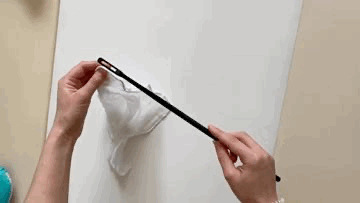This is one of the most important things to learn when you first purchase or rent your instrument and to be honest it is not discussed enough! So here we go, how do you clean your flute?
I think what many people don’t realise is that even though this instrument is made of metal; it can still get pretty gross and mould can even grow in there… yup you heard me!
It hasn’t happened too often, but I have had students come into my (small!) practice room, open up their flute case and whoosh I am hit with just the worst smell… there’s a reason there is always a bottle of perfume in my hand bag!
So here we go…
How do you clean your flute?
- Make sure you have the cleaning rod, this is the long stick with a small hole at the top, it looks a bit like a giant knitting needle! If you do not have one then I suggest investing in one immediately! You can purchase them here.
- Once you have purchased your cleaning rod, the first thing you will need to do is thread a gauze or thin cotton cloth through the hole at the top and wrap this around the cleaning rod.
- Pass this right the way through the main body of the flute to ensure all the moisture has been taken out. Once you have removed the moisture from the main tube, pass the cleaning rod right the way through the foot joint as well.
- Once both tubes are clean, we then need to take care of the head joint. For this you need to make sure the gauze/cloth is fully covering the top of the cleaning rod to ensure we get all the moisture at the top by the crown. It’s no good just having the top of the stick hitting the end of the flute!


How do you clean the outside of the flute?
It is also very important to ensure you clean the outside of the flute as well. This can be done by using a polishing cloth or a silver cloth. By doing this you will prevent your flute from tarnishing. This will also get rid of the every-day grime that you put onto your flute throughout your practice and rehearsals.
sometimes I find that the pads get sticky – why is this?
This is a common problem and to be really honest this simply comes from the condensation in the flute traveling into the pads under the keys. Hence why it is a really good idea to swab out your flute each time you play it!
I also find that pads get most sticky due to food particles being deposited into the flute whilst playing, this then travels into the pads. Make sure you do not drink anything sticky such as fizzy drinks or orange juice before you’re playing your flute! I know it seems like a nice idea to have a snack and a drink whilst doing your practice but trust me, it is not worth it! I would even go as far as to rinse your mouth out with water before playing.
My keys are already sticky – what can I do?
If you are in a position where your keys are already sticky then a good solution is to use cigarette paper. Cigarette paper is very thin and can ben used to place gently under the keys. Place it underneath, press the key down for a few seconds, then lift the key and remove the paper. Doing this a few times should remove the sticky residue from under the key.
If you are finding that this is not working, some people do like to use powder paper. However, this can end up leaving even more residue on the key and it will build up with the powder. I would suggest taking it to your local repair shop to have it looked over and cleaned professionally.
How often should I take my flute to be serviced?
It is extremely important to take your flute to the shop to be regularly looked over. Very much like an MOT on your car! This only needs to be done once every year at the most. Unless, you are a professional, in which case this could be more, simply down to the increase in usage!
A professional flute repairer will be able to take your flute apart and clean all those hard to reach places. Alongside this, they will be checking for leaks, ripped pads etc.
Is there anything I should avoid?
It is very important that you never put any kind of liquid onto your instrument. Whether this be water or oil! If you are not a trained flute technician, applying anything onto your instrument can cause deterioration. Not only of the metal itself but also to the very delicate pads under each key! It will also cause even more of that dreaded stickiness….
Try to stick to the basic cleaning materials. A cleaning rod, a gauze or cotton cloth and a polishing cloth and you are good to go!
I hope that gives you a nice, clear way of how to take care of your instrument! Let me know if you have any suggestions! Have a great week and if you have time check out my other blog posts!
Jade x
